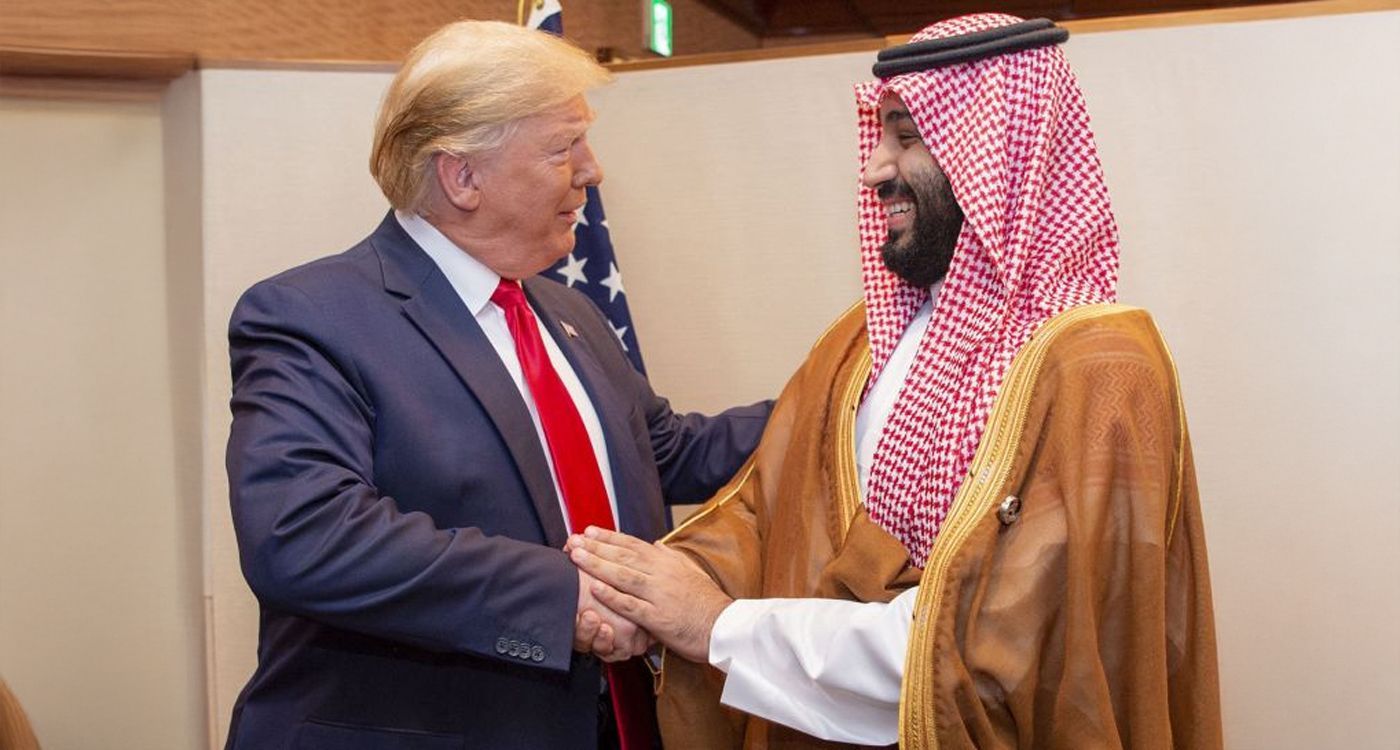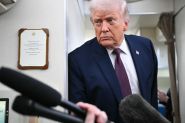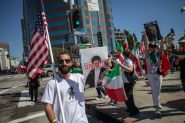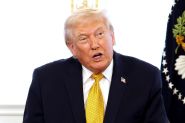- Home
- Middle East
- Trump’s Middle East Tour: Diplomacy Under the Billion-Dollar Sign

A photo provided by the Saudi Royal Palace on 29 June 2019 shows Saudi Crown Prince Mohammed bin Salman shaking hands with US President Donald Trump during their meeting on the sidelines of the G20 summit in Osaka, Japan. ©Bandar Al-Jaloud / AFP
Donald Trump begins the first diplomatic tour of his second term with a strategic visit to Gulf monarchies. This tour — which includes Saudi Arabia, Qatar, and the United Arab Emirates — aims to strengthen already solid economic ties with these hydrocarbon-rich states, with the hope of securing massive trade and investment deals.
Riyadh has already pledged $600 billion in investments in the United States over four years, while Abu Dhabi has committed to an estimated $1.4 trillion over ten years. Qatar is also expected to announce major investment promises. There is particular interest in high technology, artificial intelligence, and energy — sectors in which Gulf countries hope to expand their presence in the US.
The visit is also notable for the presence of high-profile American CEOs such as Elon Musk (CEO of Tesla), Sam Altman (CEO of OpenAI), Larry Fink (CEO of BlackRock), and Mark Zuckerberg (CEO of Meta), who will attend the US-Saudi Investment Forum. This forum, resembling a tech and economic showcase, is expected to produce several major announcements in the coming days.
Israeli-Saudi Normalization on Hold
But behind the economic excitement lies a far more complex political reality. Trump, who hoped to revive the normalization process between Israel and Saudi Arabia, is hitting a wall.
Crown Prince Mohammed bin Salman, the oil-rich kingdom’s de facto ruler, has made it clear that no diplomatic relations will be established with Tel Aviv as long as the Israeli offensive in Gaza — referred to by Riyadh as genocide — continues, and until a viable Palestinian state is established. Trump’s dream of expanding the Abraham Accords, which were signed during his first term, now appears temporarily out of reach.
According to Palestinian sources cited by Israeli media such as The Jerusalem Post and The Times of Israel, Lebanese President Joseph Aoun, Palestinian leader Mahmoud Abbas, and Syrian interim president Ahmad el-Chareh may attend meetings in Riyadh. However, these reports have not been confirmed.
The Gulf Between Caution and Engagement with Iran
Tensions with Iran and Tehran’s controversial nuclear program continue to worry Gulf capitals. Unlike in 2017 — when Riyadh and Abu Dhabi praised the US withdrawal from the Iran nuclear deal — these capitals now advocate a more conciliatory approach with Tehran.
The bitter memory of the 2019 Houthi attacks (backed by Iran’s regime) on Saudi oil installations — an incident barely condemned by the Trump administration — still lingers. Today, Gulf monarchies prefer a cautious strategy and are urging Washington to prioritize diplomacy, while remaining wary of a regional armed conflict.
A Gift from Qatar?
Another delicate point: Qatar has reportedly offered Donald Trump a luxurious Boeing 747 aircraft worth $400 million as a replacement for Air Force One. Although symbolic, the gesture raises ethical concerns among both critics and supporters.
At the same time, the US Treasury has announced the launch of an expedited process to facilitate foreign investment in American companies, particularly in semiconductors and AI — in response to strong interest from Gulf countries.
Gaza: The Unavoidable Issue
Finally, while Gaza is not officially at the top of the agenda, the conflict remains ever-present. Mediation by countries such as Qatar and Egypt continues, with hopes for a short-term truce. The announced release of the last living American hostage held by Hamas, Edan Alexander, is seen as a goodwill gesture toward Trump ahead of his visit to Doha.
Despite the opulent atmosphere surrounding his tour, Trump will not be able to ignore the shifting balance of power and regional divides. This trip — more than symbolic — reflects the evolution of the Middle East since his last visit: more cautious, more multipolar, and above all, more determined to assert its political, security, and economic priorities.
Read more




Comments